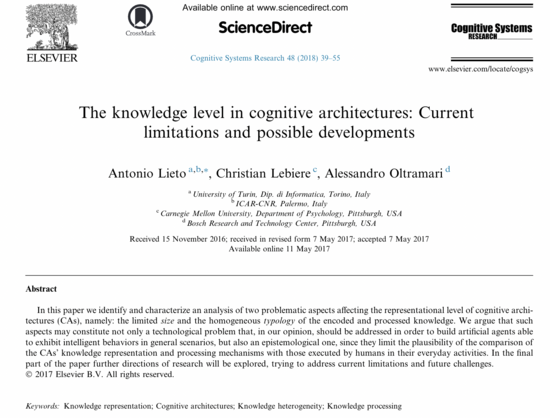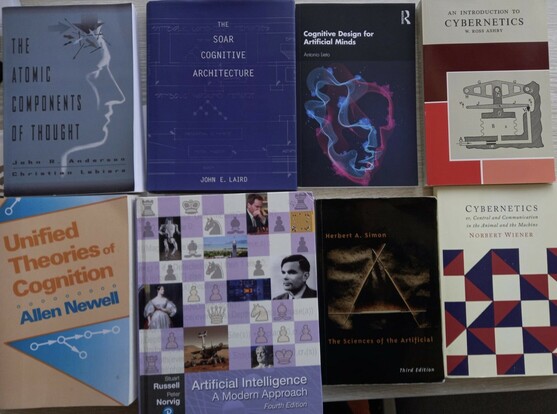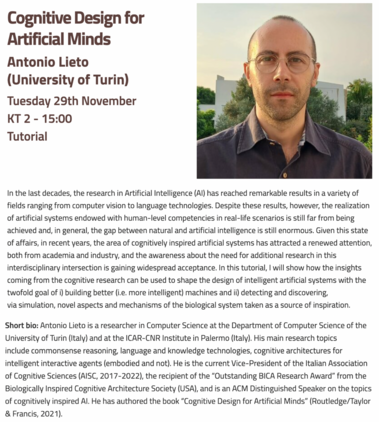Ross Gayler · @RossGayler
117 followers · 667 posts · Server aus.socialThanks @hosford42 for reminding me of this half-day tutorial on Vector Symbolic Architectures / Hyperdimensional Computing. The authors have been applying HDC/VSA to place recognition in robotics, but the tutorial coverage is much wider.
https://www.tu-chemnitz.de/etit/proaut/workshops_tutorials/hdc_ki19/index.html
#VSA #VectorSymbolicArchitecture #HDC #HyperdimensionalComputing #CogRob #CognitiveRobotics #CompCogSci #ComputationalCognitiveScience #CogSci #CognitiveScience #MathPsych #MathematicalPsychology
#vsa #vectorsymbolicarchitecture #HDC #hyperdimensionalcomputing #cogrob #CognitiveRobotics #compcogsci #computationalcognitivescience #cogsci #cognitivescience #mathpsych #mathematicalpsychology
Ross Gayler · @RossGayler
116 followers · 572 posts · Server aus.socialHelp from older folk please: In the earlier days of artificial intelligence (GOFAI) - say, the 1980s - there was an aphorism to the effect that once you had found the right data representation for your problem you had pretty much solved your problem (i.e. choice of representation dominates choice of algorithm).
I would greatly appreciate (some approximation to) the actual text of the aphorism and, if possible, some citation to its origin.
Thanks!
#AI #ArtificialIntelligence #GOFAI #GoodOldFashionedAI #aphorisms #sayings #CogSci #CognitiveScience #CompCogSci #ComputationalCognitiveScience
#ai #artificialintelligence #gofai #goodoldfashionedai #aphorisms #sayings #cogsci #cognitivescience #compcogsci #computationalcognitivescience
Ross Gayler · @RossGayler
112 followers · 543 posts · Server aus.social
Here are two high level articles that mention Vector Symbolic Architecure / HyperDimensional Computing in the more "popular" end of the technical press:
https://ieeexplore.ieee.org/stamp/stamp.jsp?arnumber=10098176
#VSA #VectorSymbolicArchitecture #HDC #HyperdimensionalComputing #CompCogSci #ComputationalCognitiveScience #CogSci #CognitiveScience #MathPsych #MathematicalPsychology
#vsa #vectorsymbolicarchitecture #HDC #hyperdimensionalcomputing #compcogsci #computationalcognitivescience #cogsci #cognitivescience #mathpsych #mathematicalpsychology
Ross Gayler · @RossGayler
95 followers · 315 posts · Server aus.socialReaders of "How is perception tractable?" (https://philpapers.org/archive/BROHIP-2.pdf) might also be interested in "High-level perception, representation, and analogy: A critique of artificial intelligence methodology" (https://www.tandfonline.com/doi/abs/10.1080/09528139208953747), which doesn't touch on computational tractability but does argue that perception is necessarily *not* encapsulated from cognition.
#CogSci #CompCogSci #CognitiveScience #ComputationalCognitiveScience #cognition #analogy @cogsci
#cogsci #compcogsci #cognitivescience #computationalcognitivescience #cognition #analogy
Ross Gayler · @RossGayler
95 followers · 315 posts · Server aus.socialBoosting with hashtags for my followers. See the original post in the thread above.
International SFI summer school on Intelligence and Representation
For PhD students, in Cambridge, UK, August 13-25, 2023. Tuition is free! Apply by March 1, 2023.
https://santafe.edu/engage/learn/programs/complexity-gains-international-summer-school
#CogSci #CognitiveScience #cognition #CompCogSci #ComputationalCognitiveScience
#cogsci #cognitivescience #cognition #compcogsci #computationalcognitivescience
Ross Gayler · @RossGayler
95 followers · 315 posts · Server aus.socialBoosting for my followers - see original post in the thread above.
The BBS target article on the Language of Thought Hypothesis states:
"We outline six core properties of
LoTs: (i) discrete constituents; (ii) role-filler independence; (iii) predicate-argument
structure; (iv) logical operators; (v) inferential promiscuity; and (vi) abstract content."
It's interesting to think about the extent to which those properties are directly enabled by neural representations using Vector Symbolic Architectures / Hyperdimensional Computing. It hadn't occurred to me to draw a line between LoT and VSA/HDC.
#CogSci #CognitiveScience #CompCogSci #ComputationalCognitiveScience #VSA #VectorSymbolicArchitecture #HDC #HyperdimensionalComputing
#cogsci #cognitivescience #compcogsci #computationalcognitivescience #vsa #vectorsymbolicarchitecture #HDC #hyperdimensionalcomputing
Antonio Lieto · @antoniolieto
126 followers · 34 posts · Server fediscience.orgLieto, A., Lebiere, C., & Oltramari, A. (2018). The knowledge level in cognitive architectures: Current limitations and possible developments. Cognitive Systems Research, 48, 39-55.
https://www.sciencedirect.com/science/article/pii/S1389041716302121
#knowledgerepresentation #knowledgeprocessing #cognitivearchitectures #cognitivesystems #ArtificialIntelligence #AI #computationalcognitivescience #commonsensereasoning #cognitivesystems #cognitivemodelling
#cognitivemodelling #commonsensereasoning #computationalcognitivescience #ai #artificialintelligence #CognitiveSystems #cognitivearchitectures #knowledgeprocessing #knowledgerepresentation
Antonio Lieto · @antoniolieto
126 followers · 33 posts · Server fediscience.orgLieto, Antonio, Lebiere, Christian, & Oltramari, Alessandro (2018). The knowledge level in cognitive architectures: Current limitations and possible developments. Cognitive Systems Research, 48, 39-55.
https://doi.org/10.1016/j.cogsys.2017.05.001
#knowledgerepresentation #knowledgeprocessing #semanticmemory #cognitivearchitectures #cognitivesystems #ArtificialIntelligence #cognitivemodelling #computationalcognitivescience #AI
#ai #computationalcognitivescience #cognitivemodelling #artificialintelligence #CognitiveSystems #cognitivearchitectures #semanticmemory #knowledgeprocessing #knowledgerepresentation
Antonio Lieto · @antoniolieto
93 followers · 28 posts · Server fediscience.orgA selection of my favourite #books to read/study covering the intersection between #ArtificialIntelligence and #CognitiveScience....(yes, I included also "Cognitive Design for Artificial Minds" https://www.amazon.com/dp/1138207950/)
#AI #cognitiveAI #computationalcognitivescience #cognitivearchitectures #research #cognitivedesignforartificialminds
#cognitivedesignforartificialminds #research #cognitivearchitectures #computationalcognitivescience #CognitiveAI #ai #cognitivescience #artificialintelligence #books
Antonio Lieto · @antoniolieto
93 followers · 28 posts · Server fediscience.orgA selection of my favourite #books to read/study covering the intersection between #ArtificialIntelligence and #CognitiveScience....(yes, I included also "Cognitive Design for Artificial Minds" https://www.amazon.com/dp/1138207950/)
#AI #cognitiveAI #computationalcognitivescience #cognitivearchitectures #research #cognitivedesignforartificialminds
#cognitivedesignforartificialminds #research #cognitivearchitectures #computationalcognitivescience #CognitiveAI #ai #cognitivescience #artificialintelligence #books
Antonio Lieto · @antoniolieto
73 followers · 21 posts · Server fediscience.orgH3: In the context of #cognitiveAI, #computationalcognitivescience, I have proposed the "Minimal Cognitive Grid" a pragmatic method to quantitatively and qualitatively rank the different degrees of biological and #cognitiveplausibility of artificial systems in order to project and predict their explanatory power with respect to the natural systems taken as a source of inspiration.
The idea was introduced in the book "Cognitive Design for Artificial Minds":
#cognitiveplausibility #computationalcognitivescience #CognitiveAI
Antonio Lieto · @antoniolieto
73 followers · 21 posts · Server fediscience.orgIn few weeks I will give an invited tutorial at AI*IA 2022 in Udine (https://aixia2022.uniud.it/keynotes-and-tutorials), the 21st International Conference of the Italian Association for #ArtificialIntelligence, on (some of) the topics covered in my #book "Cognitive Design for Artificial Minds" (https://www.amazon.com/dp/1138207950/).
#AI #cognitivesystems #CognitiveAI #cognitivescience #computationalmodelsofmind #cognitivescience #computationalcognitivescience #computationalmodelsofcognition
#computationalmodelsofcognition #computationalcognitivescience #computationalmodelsofmind #cognitivescience #CognitiveAI #CognitiveSystems #ai #book #artificialintelligence





